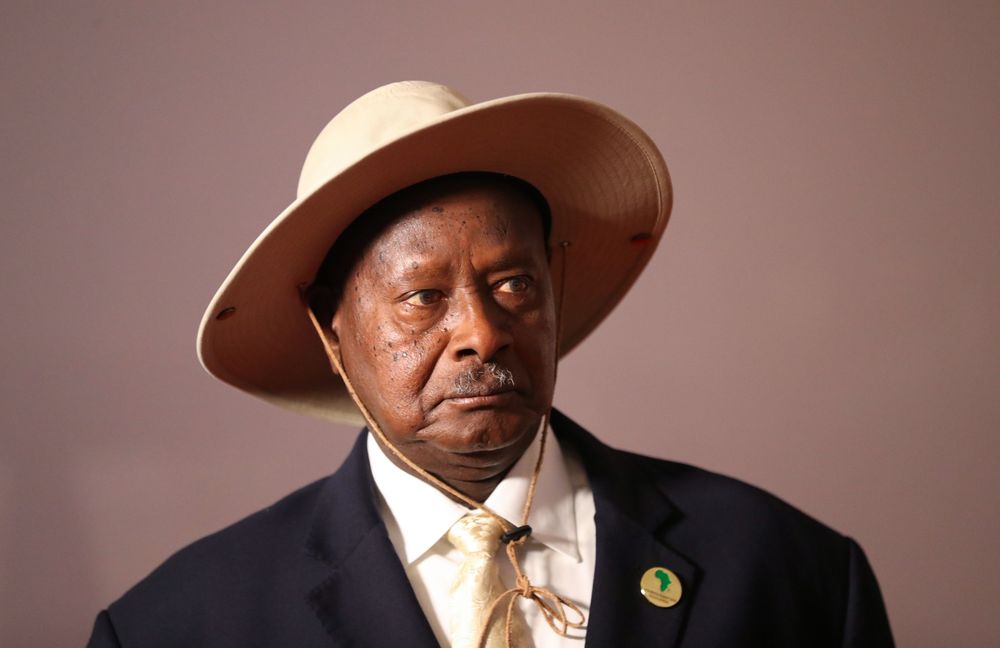
Ugandan police fire officer over leaked Museveni photo
Published on May 3, 2022 at 7:34 AM by Chisomo Kambale
Ugandan police have dismissed one of their handful of Closed-Circuit Television (CCTV) security camera network experts, a year after accusing him of leaking a photograph depicting top judicial officers meeting President Museveni shortly before the 2021 General Election petition judgment.
Ugandans took a presidential vote on January 12, 2021, and the Supreme Court upheld incumbent Yoweri Tibuhaburwa Museveni’s victory that Opposition National Unity Platform (NUP) flag bearer Robert Kyagulanyi, alias Bobi Wine, who came second, sought to annul.
Bobi Wine, citing court bias, on February 22 filed to withdraw his petition. This was days after BM TV Africa and Olujjuliro TV published on their Facebook pages a picture depicting a motorcade of the chief justice and deputy chief justice — who were part of the Coram deciding the presidential election case — and the principal judge at State House Entebbe.
The timing of the meeting raised concerns, prompting the Judiciary in a February 21, 2021 statement to clarify that its honchos visited State House on February 10 to attend the swearing-in ceremony of Justice Margaret Apiny as a High Court judge.
“It is important to note that this was an official ceremony [in] the full glare of media – there was nothing secret about it. We condemn such falsehoods being published for whatever reasons,” Judiciary spokesman Jamson Karemani noted then.
At police, investigators led by SP John Bosco Ozele arrested PC John Andiandu whom they detained for a month, without formally charging him in a court, contrary to the constitutional threshold of 48 hours.
Police seized his mobile phone handset, which reportedly remains in custody to date.
Senior police officers briefed on the matter intimated to this newspaper that the image of the leaders of the Judiciary was allegedly retrieved from an ANPR Camera system using log-in credentials belonging to a superintendent of police who has since been transferred to the police’s crime intelligence directorate.
The officer was reportedly neither arrested nor tried. We could not independently verify these claims.
After months of lull, the police subordinate disciplinary court on August 11, 2021, sitting at the Criminal Investigations Directorate (CID) headquarters in Kibuli, Kampala, convicted constable Andiandu and recommended his dismissal.
He appealed the decision, which was not heard. Instead, five months later, on January 13, 2022, a Faith Nangoma, on behalf of the Inspector General of Police Martins Okoth-Ochola, issued a summary dismissal letter for the officer.
Officers dodge letter
The letter did not reach the commandant of Aviation Police, through whom it was addressed, until three months late — on April 11, 2022.
An officer who inked a hand-written note on it without indicating their name or position, on March 11 asked the Aviation Police commandant to “recover government property” from the dismissed officer.
The commandant, however, forwarded the matter to Entebbe Police Divisional Commander, noting that it had “wrongly” been brought for their action.
Police officers knowledgeable about the ping pong said Ms. Nangoma did not provide the specifics of the disciplinary misconduct that formed the basis for PC Andiandu’s dismissal.
She wrote: “This is to inform you that the Police Appointment/Promotions Committee (Subordinates), under its Minute No. 71/08/11/2021, has directed that you be dismissed from the Force with effect [from] 8/11/ 2021.”
This would suggest that whereas the decision to exit the officer was taken on the day of his questioning, it was for unexplained reasons not communicated to him for nearly half a year.
Our attempts to speak to PC Andiandu, who was stripped of pensions, gratuity and or other retirement benefits, were futile. We were also not successful in reaching Ms Nangoma, who authored the dismissal letter, for details of the case.
In a telephone interview yesterday, police spokesman Fred Enanga expressed surprise that PC Andiandu, who last year headed Kampala Metropolitan South CCTV network, had been dismissed.
“Dismissed? Do they just dismiss people like that? That should be a disciplinary matter. I will try to find out because it is not on my desk. That’s a disciplinary matter which hasn’t come to my table yet because if I don’t have a copy, then I need to find out,” he said.
Kampala Metropolitan South CCTV team was yanked into the crosshairs of high stakes politics and apparent security breach because the virtual security network it controls covers Kampala Central Police Station (CPS), Parliament of Uganda, State Lodge Nakasero, the capital’s central business district and surrounding areas, stretching to State House Entebbe and Entebbe International Airport, making it the busiest and critical region in the metropolis .
That is where police, confident in the ability of PC Andiandu and his team, deployed him and others to oversee the Big Brother’s scan.
According to police records, the dismissed officer headed a team in 2020 that configured CCTV equipment, which includes camera, power cubes, Access Points (AP) and Remote Terminal (RT).
The team installed CCTV equipment from Njeru in Buikwe District up to Uganda’s Busia and Malaba border posts with Kenya as well as parts of Karamoja, Teso and Acholi sub-regions.
Police divided
Highly-placed sources said the top police leadership is divided over the technician’s dismissal, with some questioning the manner in which he was sent away.
Others are uncomfortable that an officer of his pedigree could be exited at a time when the police security camera network is troubled by fibre cuts and operational glitches which, combined, have created loop blackholes and hamstrung police ability to provide all-round watch over the capital.
This publication broke the story of failing cameras and limited personnel last month, and published a detailed follow up last week.
One source at the police ICT directorate told this newspaper that PC Andiandu was one of “the most qualified and experienced” technicians manning the camera network.
“We have few officers skilled in that area and this [his dismissal] is likely to affect the network management,” said the source.
Another source said the exit of PC Andiandu was unusual because police, in a departure from practice, did not send the Wireless Transmission Message to its rank-and-file about it.
Failing cameras
This publication in an exclusive published last week unearthed how the CCTV cameras network, installed on orders of President Museveni in response to high-profile killings in Kampala, has suffered multiple blind spots.
The story chronicled how the Uganda Police Force is currently burdened by how to fix a litany of problems on the security infrastructure.
Sources at police headquarters in Naguru, a Kampala outskirt, said expose our sparked accusations and counter-accusations among senior police officers and the deputy Inspector General of Police, Maj Gen Tumussime Katsigazi, who had previously downplayed our first reporting on the CCTV project hitches, summoned acting ICT Director Yusuf Ssewanyana to explain what was amiss.
We were unable to get details of the meeting.
In yesterday’s telephone interview, Mr Enanga said our reporting was “inaccurate”, but he did not respond to any specifics, promising to do so either today or tomorrow.
Our investigations found that the project is currently dogged by corruption, limited resources and manpower, among other challenges.
For instance, five CCTV cameras in Nakawuka in Wakiso District have reportedly been off the network for close to one year despite several reminders to management by the technicians.
Some of the city police divisions and stations, another source said, have had blackouts of almost three weeks due to cuts of fibre that connects the cameras to the main grid at the National CCTV Command Centre at Police headquarters in Naguru, Kampala.
It is also alleged that some senior officers pocket money paid by arrested vandals, including drivers who smash the camera poles, instead of using it to fix the cameras.
Accounts offered last week by sources familiar with workings of the security cameras show that Kampala Metropolitan South and North, where the city centre falls, have the worst performing CCTV camera network.
The problem of failing cameras was reported most in Wakiso District’s Nsangi where more than half of the 98 cameras are dysfunctional, creating partial surveillance blackhole over Nabbingo, Kitemu, Buddu junction, Nalumunye, Hana junction and Kyengera Town council.
Insiders revealed that the effectiveness of CCTV cameras in the Kampala metropolitan is estimated to have dropped by 18 percentage points over three months from the 80 percent high of the past.
More functional cameras are reported in Kampala Metropolitan East than the Metropolitan South and North.
The problem is not just off-network cameras. Police reportedly have no budget for the vast infrastructure; so, routine maintenance is missing and there is no company contracted to conduct remedial works.
As a result, most of the network links go off for days without being fixed because repairs require highly-skilled personnel, also in short supply within the police.
THE CCTV PROJECT
The National CCTV Network Expansion Project started in 2018 and was bankrolled in part with a $104m (Shs369b) loan that the government picked from Standard Chartered Bank.
The government moved to install the spy cameras at the prodding of President Museveni, the commander-in-chief, on the back of inconclusive investigations into the then rising killing of notable citi


